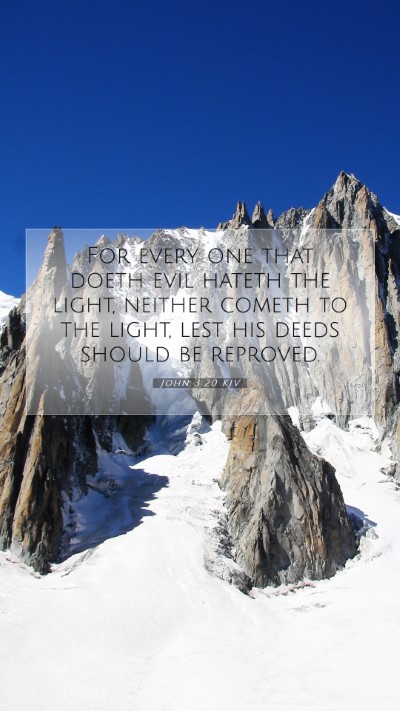Understanding John 3:20
John 3:20 states: "For everyone who does wicked things hates the light and does not come to the light, lest his works should be exposed." This verse encapsulates a profound truth about human nature and the relationship between light and darkness, which serves as a metaphor for good and evil, holiness and sin. Below, we explore various interpretations and insights derived from public domain commentaries.
Bible Verse Meanings
This verse serves as a warning against the tendency of individuals to shy away from the truth. The "light" symbolizes the righteousness and truth of Christ, while "wicked things" represent sinful actions. According to Matthew Henry, this passage emphasizes the aversion of those who are inherently sinful to the righteous standards set forth by God. Unlike the righteous who take joy in the light, the wicked prefer to remain in the obscurity of sin.
Bible Verse Interpretations
Albert Barnes adds that the “light” mentioned in this verse is not merely physical but represents divine knowledge and moral accountability. Those involved in wrongdoing often reject this light due to fear of exposure, leading to a deeper understanding of why many resist the call to repentance. This symbolic separation serves to help believers recognize the importance of living openly according to God's truth.
Bible Verse Understanding
Adam Clarke elaborates by pointing out that this reluctance to come to the light reflects a profound spiritual blindness. In essence, it draws upon the human fear of being judged or exposed, which is often cited as a fundamental reason for the rejection of divine truth. The light's illuminating nature has the power to reveal the hidden motives of the heart.
Scripture Analysis
Analyzing John 3:20 within its wider context reveals a stark contrast with the preceding verses, particularly John 3:19, which elaborates that judgment is a direct consequence of one's preference for darkness. Understanding these verses highlights the importance of choosing to align oneself with the light to receive salvation and freedom from sin.
Biblical Exegesis
Through biblical exegesis, one can derive that this verse calls for introspection among believers and seekers alike. It challenges the reader to assess their own lives in light of the truth of the Gospel: Are we embracing the light, or are we retreating into darkness out of fear of exposure?
Bible Study Insights
In group Bible studies, discussing John 3:20 can lead to deep conversations about personal accountability and the nature of sin. It can serve as a catalyst for understanding the transformative power of accepting Christ and living authentically. This verse can elicit questions such as:
- What does it mean to walk in the light?
- Why do people choose to remain in darkness?
- How can we be a light to others who are struggling with sin?
Application of Bible Verses to Daily Life
As believers, applying the teaching of John 3:20 invites introspection about our own behaviors. Every act of kindness and goodness reflects coming into the light, whereas every action motivated by selfishness and malignity symbolizes a step back into darkness. Recognizing this duality helps believers strive for a more Christ-like character.
Cross References
John 3:20 is interconnected with several other scriptures that reinforce its meaning:
- John 1:5: "The light shines in the darkness, and the darkness has not overcome it." This underscores the prevailing power of light over darkness.
- Ephesians 5:13: "But when anything is exposed by the light, it becomes visible." This illustrates how God's truth reveals sin.
- 1 John 1:6: "If we say we have fellowship with him while we walk in darkness, we lie and do not practice the truth." This emphasizes the necessity of walking in the light to be in harmony with God.
Conclusion
In conclusion, John 3:20 challenges individuals to reflect on their relationship with light and darkness. Its profound insights remind us of the importance of coming to Christ for redemption. This verse serves as an essential portion of scripture, urging believers towards greater dedication to living in the truth.


